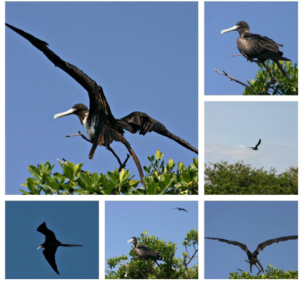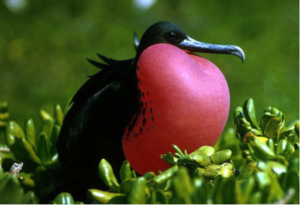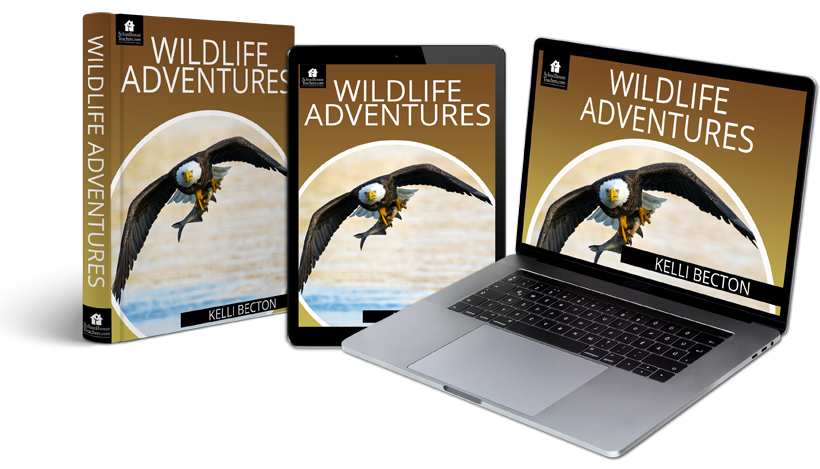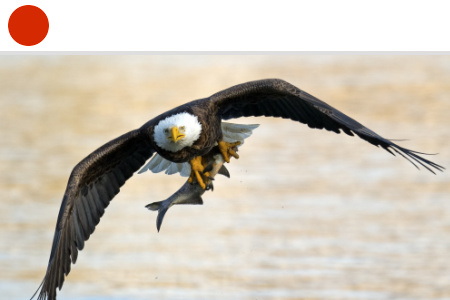Course Sample for Our Wildlife Adventures Animal Science Homeschool Curriculum
This is an excerpt from Lesson One.
Welcome to Wildlife Adventures: Land and Sea
The Magnificent Frigate Bird
. . . .life above the open ocean

Frigatebird (Fregata magnificens) a.k.a. Magnificent Frigatebird or Man’O War
The frigate is one of the most interesting species of seabirds, nick-named Man’O War because of its habit of pirating food from other birds. The frigatebird will swoop in and attack other birds, stealing their meal. Frigates also eat jellyfish, turtles, and squid. They are a member of the Fregatidae family—genus Fregata—and are related to pelicans. In some places, they are called frigate pelicans.
Frigates are known for their long wings that can span between six to eight feet. They have the longest wingspan per body weight of any other bird. They are graceful gliders and have a swallow, or split, tail—extremely aerodynamic. Frigates spend most of their time flying over the waters of the tropical Atlantic, and other tropical seas, coming in to roost only when it is time to mate. They spend most of their lives in the air.
Frigatebirds are pelagic feeders, which means they feed on fish that are not close to shore. When fish live away from the coast, and not on the continental shelf, they live in the pelagic zone, also called the open-ocean.
The pelagic zone is the opposite of the benthic zone, which consists of animals that live on the bottom of the sea. Crabs and clams are examples of these benthos marine organisms.
Experienced fishermen watch out for the frigates, which are known to track predators, such as sharks, that herd baitfish toward the surface, thus making it easy to pluck a meal right out of the water.
Each year they choose one mate and the female lays a single egg with an incubation period of 55 days. Frigates nest in colonies. The male frigate has a red throat pouch, which he inflates to attract a mate—see the picture just below! Females take care of their young for about a year and so are able to mate every two years. The males mate annually. They spend more time caring for their young than any other species of bird. The young have to be fed and grow strong enough to be able to fly long distances high over the water. Frigates even sleep “on the wing.” There are studies currently going on to try and learn more about their sleeping patterns.

Picture credit Wikimedia Commons
Bible reading:
Genesis 1:20-25
New International Version (NIV)
20 And God said, “Let the water teem with living creatures, and let birds fly above the earth across the vault of the sky.” 21 So God created the great
creatures of the sea and every living thing with which the water teems and that moves about in it, according to their kinds, and every winged bird according to its kind. And God saw that it was good. 22 God blessed them and said, “Be fruitful and increase in number and fill the water in the seas, and let the birds increase on the earth.”23 And there was evening, and there was morning—the fifth day.
24 And God said, “Let the land produce living creatures according to their kinds: the livestock, the creatures that move along the ground, and the wild animals, each according to its kind.” And it was so. 25 God made the wild animals according to their kinds, the livestock according to their kinds, and all the creatures that move along the ground according to their kinds. And God saw that it was good.
Bible memory verse:
Genesis 1: 20
20 And God said, “Let the water teem with living creatures, and let birds fly above the earth across the vault of the sky.”
Discussion:
Do the Bible reading with your children and ask questions to open up the discussion about how God created the birds of the air and the fish of the sea. Feel free to expand the Scripture memory work for older students.
Vocabulary + Spelling — these words come from the main reading in the lesson:
Habit – a tendency to act in a certain way, an established custom or tradition Tropical – hot and humid located in the tropics, near the equator
Roost – a place, perch, or branch where birds go to sleep Pelagic – organisms living in or on the open sea
Pelagic zone – the open sea, away from shore
Continental shelf – the relatively shallow sea bed surrounding a continent Benthic zone – relating to the bottom of the sea or lake
Benthos – organisms living at the bottom of the sea or lake
Predators – an animal that lives by capturing and eating other animals Pluck – to remove quickly, a quick pull or tug
Incubation – sitting on eggs so as to hatch them with the warmth of the body Inflate – to fill something with air or gas, making it expand
Spelling for younger students:
Bird habit
Swoop pluck
Roost wing
Egg fish
Sea fly
* Bonus word: ocean

































